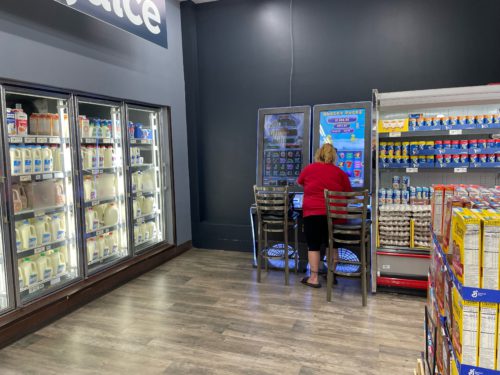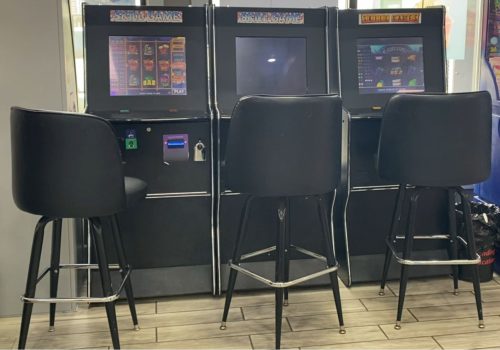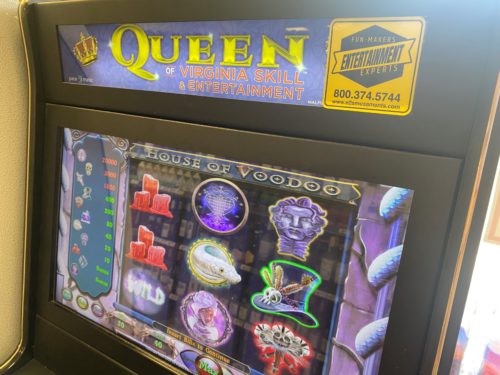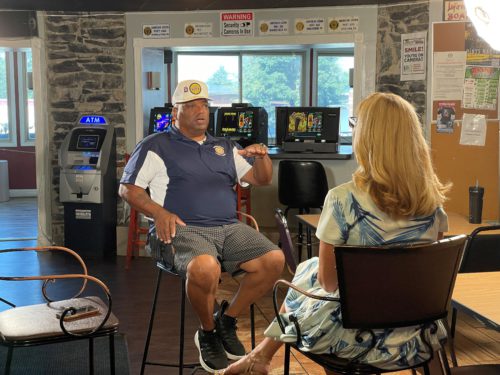By Joce Sterman and Daniela Molina
Arnolt Center & InvestigateTV — Machines that look like the slots found in Las Vegas casinos are popping up in gas stations, convenience stores, bars and social halls across the nation.
They may look similar, but these games play by a different set of rules, which has created regulatory headaches and confusion nationwide — with players questioning whether they’re legal and law enforcement struggling to police them.
Ron Foreman has become all too familiar with the gaming machines that have turned up in locations all around his home in rural Missouri.
After battling a gambling addiction for the last 20 years, he said they have become his Achilles’ heel.
“I feel stupid. I feel ignorant. I mean, it is stupid,” Foreman said. “But it’s just not a choice for me, man. It’s an addiction that just totally ruined my life more than once.”
He said his addiction had been fairly under control since 2004, when Foreman voluntarily added himself to Missouri’s List of Disassociated Persons, a directory created by the state’s gaming commission to help problem gamblers with accountability. The move excluded him from visiting any licensed casinos in the state.
However, that list has no authority over so-called skill game machines that began to appear all over Missouri in 2020. The unregulated video machines popped up in gas stations and grocery stores near Foreman’s home and proved too tempting.
After cashing out a settlement from a car accident he was involved in, Foreman told InvestigateTV he put every dollar into skill game machines.
“I had $150,000 cash in October and by December, I was broke,” he said.

Ron Foreman displays cash he had on hand following the settlement he received from a car accident. (Photo Credit: Ron Foreman)
That was just the beginning — Foreman eventually gambled away hundreds of thousands of additional dollars.
Foreman’s path to financial ruin by way of these skill games was documented by his girlfriend Vikki Young thanks to his smartphone’s GPS.From the grocery store nearby that has machines tucked between the eggs and milk to the gas station down the street from the couple’s home, the data tracks each time he visited locations with a gaming unit. In two years, Foreman visited the gas station alone 310 times.
“It’s an every day, all day, every chance he can possibly get thing,” Young explained.

Inside a Missouri grocery store, skill games can be found in the refrigerator section – tucked between the milk and the eggs (Photo Credit: Noah Brooks, KMOV)
As skill games spread, critics highlight dangers and call for stronger regulation
The machines like those that took Foreman’s fortune are spreading across the country. They’re not technically slot machines, which are the heavily regulated and taxed games based on luck that are typically found in casinos in states with legalized gambling.
In contrast, “skill games” require players to make choices to win, a distinction that has landed the games in a gray area in many states — falling into what critics, including the American Gaming Association, consider unregulated gambling.
“There are no regulatory restrictions on them and they’re literally hiding in plain sight,” AGA President and CEO Bill Miller said.
According to Miller, legal casinos are now competing with operators who aren’t under the same scrutiny.
He pointed to a 2022 study commissioned by the lobbying group, which estimates that in 2021 there were at least 500,000 unregulated gaming machines across the country. Those machines, the study says, took more than $100 billion in bets.
“I think the greatest danger is the lack of consumer protections,” Miller said. “They are plugged into the wall, and they operate exactly like a slot machine without any of the protections for someone who might have a problem with gambling or somebody who might not be 21.”
InvestigateTV spotted skill games in gas stations, convenience stores and bars in Kentucky, Nebraska, Pennsylvania, South Carolina and Virginia. Although some machines InvestigateTV saw clearly stated age requirements to play or that an ID was needed to claim any winnings, many machines did not have either. On top of that, many of the locations hosting these games did not appear to have any systems in place to verify a winner’s age or bar gamblers from betting.

A set of skill game machines line the windows inside a Kentucky gas station. The games were banned in the state in the summer of 2023 (Photo Credit: Joce Sterman, InvestigateTV)
A class action lawsuit filed earlier this year against a skill game manufacturer even included pictures of kids playing the machines and also raised other concerns InvestigateTV has repeatedly heard from opponents, such as the fairness of payouts, the impact on addicted gamblers and the lack of security for players or employees who handle the cash.
“If you’re going to put in charge of that control an 18-year-old store clerk who’s making hotdogs and selling Slurpees and is also going to be in charge of ensuring that people are of age and don’t have gambling problems, I think that’s crazy and very terrible policy,” Miller said.
Skill games fall into a gray area of the law in many states
But policy is where this kind of play gets tricky. It comes down to the difference between gambling and gaming — and that difference depends on who you ask.
Many states have outlawed slot machines outside casinos, but the laws are often murky, so video gaming machines are not considered slots. Instead, they’re classified as skill games.
Still, law enforcement in some states have taken action against businesses that host these games, despite the confusion in the law. InvestigateTV obtained video, pictures and closed case files from police and gaming commissions across the country, showing skill or slot style machines those agencies consider illegal being seized in states including Florida, Idaho, Michigan, and Missouri.
There’s a lot of contradiction when it comes to cracking down on what some consider ‘gray machines.’
One Missouri prosecutor seized skill games and crushed them in a public event two years ago, calling them illegal — but lawmakers in that state are fighting to get a formal law that makes it crystal clear.
In Pennsylvania, police, the state’s Gaming Commission and its former attorney general — now governor — have said skill games are illegal.
However, the courts have disagreed, so people play on.
Even in Virginia, where lawmakers actually voted to ban skill games machines in 2021, a court decision that followed let some stay up and running.
Skill game makers say courts have supported their place in the market
Manufacturers and distributors of skill games claim they don’t see the confusion.
Michael Barley is the chief public affairs officer for Pace-O-Matic, one of the largest skill game makers in the country.
“I never buy into this ‘gray area’ because to me you’re either legal or illegal,” he said. “It’s black and white. We’re legal.”
Barley said court decisions across the country have consistently shown his company’s machines meet legal muster. The big reason, he argued, is that evidence establishes they’re not games of chance, but rather games that require some choice and interaction from the players themselves — in other words: skill.
Barley demonstrated Pace-O-Matic’s machines for InvestigateTV, showing how skill machine players on the company’s games can see the outcome and know whether the next game is a winner before risking any money.
“There’s skill in that, just involved in choosing to play before you ever put money into the game. And then once you get there, sometimes there’s multiple combinations, you have to pick the best one. There’s a time feature, the higher the prize, the less time you have to select the box,” Barley said.
However, critics like Miller and the AGA say the skill required to play these games is nothing more than the touch of a button, insisting the matter is simply about semantics.
Barley vehemently disagreed, pointing again to the court decisions that have sided with skill game makers.

A skill game manufactured by Pace-O-Matic sits inside a Virginia convenience store (Photo Credit: Joce Sterman)
Both sides do agree on the need to regulate and tax the machines — though game makers and supporters say not at the level of casinos.
Right now, revenue from skill machines is taxed at a fraction of the rate of casino slots, if at all. The AGA and lawmakers pushing for stronger regulation on skill games have pointed to billion-dollar losses in state tax revenue because of unregulated machines.
“We provide a significant amount of taxes. We provide an incredible number of jobs, good paying jobs at the casinos. But then we create an economic impact for the community that had been left behind by the auto industry or the steel industry,” Miller said. “These other guys can’t claim that these machines act and perform just like slot machines, but they don’t want to or want to make investments in the communities in which they operate.”
Skill game supporters point to business, community benefits
Still, even without specific taxation, some proponents of skill games have been vocal that the small businesses and charity organizations that host the machines reap large benefits.
Commander Stephen Holmes leads American Legion Post #733 in Harrisburg, PA. He said the addition of skill games to their lounge kept the organization afloat during the financial hardships of the COVID-19 pandemic.
“What we do for the veterans of the United States with the revenue we get here, compared to what we would be able to do if we didn’t have them, it would be miniscule,” Holmes said. “This wouldn’t be possible without that gaming revenue. Not at all.”

Commander Stephen Holmes of American Legion Post #733 has been a vocal supporter of skill games in Pennsylvania, calling them a “lifeline” to struggling businesses and organizations that host them (Photo Credit: Scotty Smith, InvestigateTV)
Holmes said the money generated by skill games has been critical for funding needed improvements at the post, including fixing a dangerous floor, replacing old air conditioning units, repairing a leaking ceiling and even adding on a new deck.
Holmes joins a growing chorus of nonprofits and business coalitions who support allowing and regulating skill games.
Groups like the AGA say those rules should include the kind of requirements casinos have when it comes to payout percentages and testing by state regulators to ensure fairness, but some say the concern is overblown.
“Not one time have I had anyone come to me with a concern,” Holmes said. “If it wasn’t giving back, they wouldn’t be here.”
Still, addicted gamblers like Missouri’s Ron Foreman and his girlfriend, Vikki Young, know the cost of giving-in when it feels like skill game machines are everywhere they turn.
“I wish they would get them out of here,” Foreman said, “Get out of these places and put them in a casino where they belong.”
Young Agreed. “It’s like putting a buffet full of desserts at an Overeaters Anonymous meeting,” she said.

Ron Foreman and his girlfriend, Vikki Young, talk about the impact skill games have had on their lives (Photo Credit: Noah Brooks, KMOV)
For Young and Foreman, that temptation has meant swallowing losses totaling almost $400,000 — money that was meant for their life together.
“It’s hard. You have hopes and dreams and you’re just watching them thrown away for nothing,” Young said.
Olivia Bianco, Mina Denny, Sophie Kaelble, Haley Miller, and Jasmine Wright are students with the Arnolt Center for Investigative Journalism at Indiana University and contributed research to this story.


